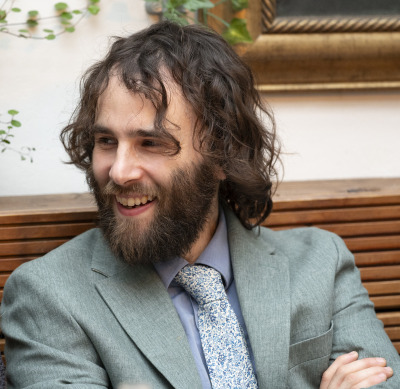Dr Flurin Eisner
PhD, MSci, FHEA
Lecturer in Green Energy and Sustainable Engineering
Laser and Non-Ionising Radiation Lead
219A, Engineering, Mile End
| Feedback/ support hours: |
Mondays 1300-1500 |
| Expertise: | My main area of research is on organic-semiconductor based solar energy conversion devices, which can be dissolved in solution to form a solar ink that can be easily painted on substrates like plastic; for example to make low-cost and lightweight solar panels. My work involves trying to gain an increased understanding of the underlying physics of how they work in order to find ways to improve the performance of such materials and devices. My other interests also include other renewable technologies, such as producing green hydrogen by solar-powered water splitting. |
| Research Centre: | Sustainable Engineering |
| Affiliations: | Fellow of the Higher Education Authority |
Brief Biography
Flurin obtained his MSci in Physics from the University of Bristol in 2014, winning first prize in Physics in the International Undergraduate Awards for his Master's thesis, and went on on to do a PhD at Imperial College in the groups of Prof. Thomas Anthopoulos and Prof. Jenny Nelson in the Department of Physics, working on hybrid and organic photovoltaics. He obtained his PhD in 2018, receiving the Technology Partnership Prize from the Department of Physics for his thesis. Following his PhD, Flurin was awarded a EPSRC Doctoral Prize Fellowship to work on inorganic/organic bilayer solar cells and photodetectors and became an Assistant Supervisor in the Department of Physics. In 2023 he was awarded an Imperial College Research Fellowship in the Imperial College Department of Materials to work on materials and devices for sustainable solar fuels generation, before moving to Queen Mary as a Lecturer in January 2024.
Flurin is passionate about outreach, in particular getting young people excited and interested in science and engineering. He has worked expensively with the Wohl Outreach Lab at Imperial, leading workshops and running hands-on experiments for students from local schools to break down barriers between school and university and nurturing the talents of young and brilliant potential scientists.
Flurin is passionate about outreach, in particular getting young people excited and interested in science and engineering. He has worked expensively with the Wohl Outreach Lab at Imperial, leading workshops and running hands-on experiments for students from local schools to break down barriers between school and university and nurturing the talents of young and brilliant potential scientists.




